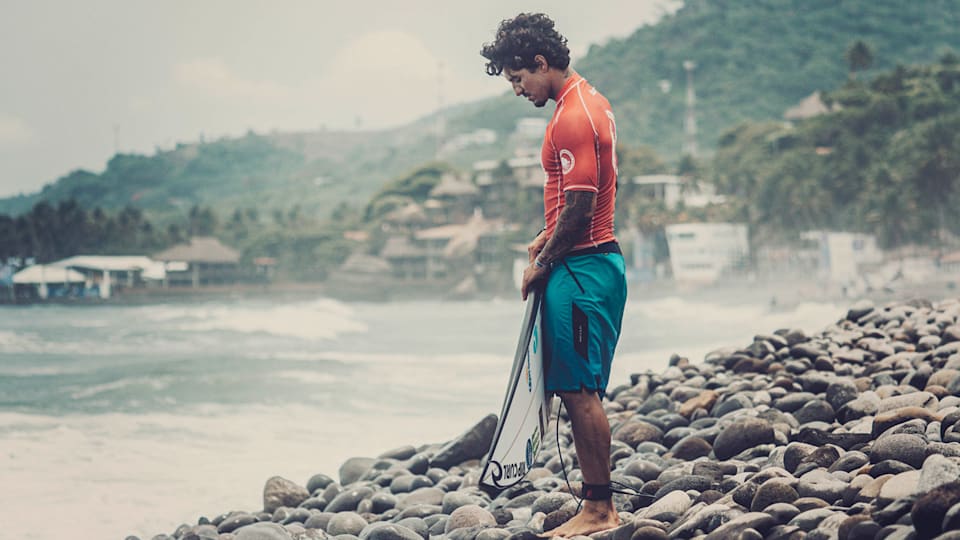Let's Move Beyond Waves: Unpacking mental health strategies among elite surfers
Dealing with pre-competition nerves and outside pressure to perform is a part of being an elite athlete. In surfing, there is also the unpredictability of having the ocean as a venue. Olympics.com spoke to some of the world’s best surfers about the hardest moments they faced and the strategies they developed for getting over these hurdles.

Surfing at an international competition can be tough on the mind. Now, imagine lounging in a wicker chair on the shore when you hear that your heat started 10 minutes ago.
That is the mental battle that Greece’s Alexandra Kolla had to fight at the 2023 ISA World Surfing Games, which are taking place from 30 May to 7 June in El Salvador.
“We’re just sitting here waiting for the heat. We’re completely on point, an hour early, asking when we're going in. We're like, ‘Oh, we're going at 11:40’. And then when the heat started, they're like, ‘Oh, you're on. This is your heat’. So I grab my jersey, start pedalling out the fastest that I've ever paddled out in my life,” Kolla told Olympics.com after her dash to compete.
With the announcers already describing the moves of the other athletes in the heat, Kolla kept paddling against the powerful waves that kept pushing her backward.
Despite her late entry into the water, she never considered not competing. And when she came out of the water, having finished third, Kolla had a smile on her face.
_“_I felt like I have to do my best with what I have because this is all I have,” she said. “There's no point in complaining or giving up. There's no point in doing anything else because this is the situation. I have to change my mindset. I can't change the situation."
While dealing with a delayed call-up is not something that happens often in surfing, there are other mental battles that surfers face every day, especially considering how many factors in the sport are outside their control.
Athletes have different approaches to training their mind for such challenges, but there is one thing they also have in common – the higher up the ranks the athletes are, the more often you see them giving their mental health as much consideration as they do their physical strength.
Mind versus crisis situations
In addition to being an international surfer, Kolla competes in bodybuilding. While that muscle helped her to paddle fast into the line-up, she also tapped into her mental powers to push through the first-round heat.
“I have a very strong body, so I believe in my ability to achieve, including in high stress. I believe in my body,” Kolla said. “I'm thinking about what I need to do now to do my personal best. That helps because all I can do in any situation is my personal best. Nothing else depends on me."
Learning to believe in her skills is something that Portugal’s Francisca Veselko also had to do on her journey to the top.
The 20-year-old surfer advanced to the Women’s Challenger Series in 2022 after an outstanding year on the national tour. Once there, however, Veselko quickly realised things would be tougher than they seemed.
Her best result in the first five stages was 25th, and she soon got discouraged.
“I was doing really good in the Portuguese contests and in Europe and then I surfed in my first year in the Challenger Series and it went really wrong. It didn’t go my way and it was kind of a shocker,” Veselko told Olympics.com. “It was something new. I wasn’t used to surfing against so many different girls, and some of the best in the world.”
Realising it was not enough to train in the water or in the gym, Veselko started talking with a psychologist to regain her confidence.
And the strategy worked. The Portuguese surfer clinched the World’s Junior Tour title later in 2022 and also came back roaring into the senior competitions, recording one of the best total heat scores in the women’s first round at the 2023 ISA World Surfing Games.
“Working with my psychologist, with all the emotions, just made me believe in myself and in my surfing,” Veselko said. “I feel like all the bad results really made me grow and I feel even more confident this year after the junior title too. I feel like my surfing’s there, I just have to do my thing and focus on myself and not on the other people.”
Mind versus pressure
While dealing with difficult situations can be a burden on the mind, so can success.
Brazil’s Filipe Toledo felt the pressure build as he won more and more competitions on the World Championship Tour, becoming one of the top players on an already high-profile Brazilian team.
And as things got more difficult, Toledo realised that he needed outside help.
_“_There came a moment when it became something very heavy for me in relation to the Championship (Tour), the obligations of sponsors and obligations with the travelling league and my children,” Toledo told Olympics.com. “It took me a long time before I could start doing mental work, so much so that it came to a point in my life where I was very unwell psychologically.
“I had to look for a professional because I wasn't moving forward. And that's when things started to work out. I started talking. I started to know more, to know myself more as well. I always try to follow up with a professional. Nowadays there are thousands of opportunities for you to work on this. And that's what I did. I tried to evolve and to improve, to get it all out.”
Seeking professional help is a pathway that Toledo recommends to others as well.
But if turning to a psychologist is not an option, USA’s Griffin Colapinto has other solutions.
The world No.1 is known as a new breed of surfers, who trains not only the body, but also the mind. His favourite go-to’s include meditation and journaling.
Colapinto and his younger brother Crosby even designed and released a guided journal based on their own daily journal entries.
_“_To work on myself and my mental aspect, it's been a really big part of my progress in the last few years,” Colapinto told Olympics.com. “It's really important because the better you get to know your thoughts and what comes into your head, then you can start noticing like negative thoughts, good thoughts. And then from there you can of see those negative thoughts and you're not really attached to them. You get good at doing that and pushing (them) aside, understanding that those thoughts aren't you.”
Mind versus ocean
While athletes across all sports can face mental health struggles, what makes surfers particularly vulnerable are the many uncontrollable elements in their sport.
No matter how much surfers train and how prepared they are, sometimes the waves simply do not come.
“We are dealing with nature, with something uncontrollable. It's something that we have to adapt to,” Toledo said. “Things are a little easier to control if you arrive at the skateboard park. No, I'm not diminishing any other sport. It's just as difficult. But you have a ramp, for example. In our case, where we have the pools - so I have a pool 24 hours a day to train - then it's easier. But when you're dealing with nature, then there's a lot outside your control. Different board, different wave, hot water, cold water, sand, stone. There are a lot of variables that can make the sport very dynamic.”
While he cannot control the elements, Toledo does his best to anticipate what he might face through careful observation of the waves that he surfs.
Ultimately, he said, it is how the surfer adapts to the unexpected that makes the difference.
Olympian Brisa Hennessy shares that view. Growing up in Costa Rica’s jungle and moving to Hawaii at age 9, she has surfed some of the wildest and most unpredictable waves.
“Being a surfer, change is constant. You're trying to live in the moment because that's the only way you can win. Your mentality has to be strong, way stronger than your talent,” Hennessy told Olympics.com. “Surfers have to have a stronger mind than anyone could ever imagine because the rollercoaster of emotions that you feel constantly is the most draining thing ever. But it can set you free too. If you show up to a contest and have no expectations and just go with the flow, that's when you're going to do your best. It’s a beautiful thing.”

